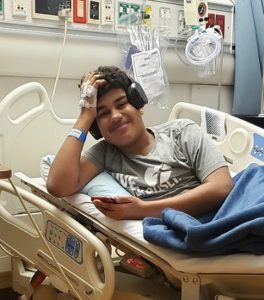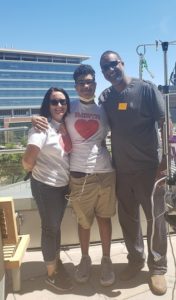Waiting
July 21, 2020:
“A transplant would mean freedom,” said 17-year-old Max Williams. “I could play sports with my friends and not have to sit out after a few minutes. It would mean I could graduate and become an adult. Getting my heart transplant would give me life.”
Max has been waiting for a heart transplant since January, and the majority of that time he has spent hospitalized at UF Heath Shands Hospital in Gainesville, Florida.
He was born a full-term, 7-pound, 2-ounce baby; however, at 18 weeks gestation, he was diagnosed with hypoplastic left heart syndrome, a congenital heart defect that impacts normal blood flow through the heart.
Max spent his first two months of life in the hospital in Columbus, Ohio, undergoing multiple procedures. At three days old, Max underwent a procedure to reduce excessive blood flow to the lungs. He did not respond well, having to get a feeding tube and growing at a very slow rate. At three months old, Max underwent a more involved open-heart surgery to attempt to improve his heart defect.

Max Williams at UF Health Shands Hospital waiting for his heart transplant.
At three years old, Max had his final surgery to redirect blood flow to his lungs. He recovered quickly and did not spend another night in the hospital for many years, until more recently.
When school began in August at Williston Central Christian Academy, Max felt extremely fatigued. This was abnormal. Max always had energy for school, sports and any other activities. After a visit to his long-time cardiologist at Orlando Health Arnold Palmer Hospital for Children, where he underwent a cardiac MRI and catheterization, it was clear that Max was in heart failure.
Max was placed onto new medications but continued to do poorly. By December, he could not get out of bed. His cardiologist referred him to UF Health Shands Hospital, where he learned that his only option would be a heart transplant.
In mid-January, Max was officially added to the heart transplant waiting list. On February 3, he was admitted to the hospital, and he has not left the hospital since. His status is “1A,” meaning he is in the top tier of potential transplant recipients.
“Initially, we all did really well,” said Erin Williams, Max’s mother. “We had a routine. His friends were able to come visit, and his spirits were high. As two weeks turned into four weeks, the reality set in that this wasn’t going to be quick.”
The coronavirus pandemic has made an already difficult situation nearly unbearable, according to Erin. Max went from being able to have many visitors to just one parent allowed bedside from March 26 until June. He is now permitted one additional visitor, which has helped pass the days.

Max Williams with his parents at UF Health Shands Hospital in Gainesville, Fla.
Throughout his wait, Max’s Williston, Florida, community has supported the Williams family, creating Donate Life T-shirts and wearing them every Wednesday during the school year, sending gifts, calling Max, and doing whatever can be done to lift his spirits.
“From the moment we knew his health was declining, our community has rallied around Max in every way,” Erin said. “A few weeks ago, the grandparent of a former student of mine organized a parade of sorts for him. People drove from Williston with signs and gifts, just to brighten his day. It really helped to rally his mood at a time when he was feeling so down about missing home and his old life.”
Erin also is grateful to the UF Health nurses on Max’s unit who not only play games and share treats with him, but also threw him a “100 Day Party” for his 100th day in the hospital.
“There are a lot of kids and adults waiting,” Max said. “Some of them have been waiting a lot longer than me, and I have been waiting a long time. Some of them are just tiny babies. They haven’t even left the hospital yet. If someone you love dies, you can’t change that, but you can make the best of it by giving their organs to people who could go on to do a lot of really good stuff in the world.”
Nationally, more than 110,000 people are waiting for organ transplants, and 3,500 of them are waiting for hearts. While her son waits, Erin wants to encourage more people to consider the impact donation has.
“With so many waiting, why not be a donor?” Erin said. “What will your loved ones do with your perfectly functioning heart, if you no longer have brain activity? They can donate them and give life to those organs in someone else. Your loved one will live on for generations to come. Your loved one’s heart will give Max a senior year of high school, a chance to live a full life as a young adult, a chance to become a father himself.”







